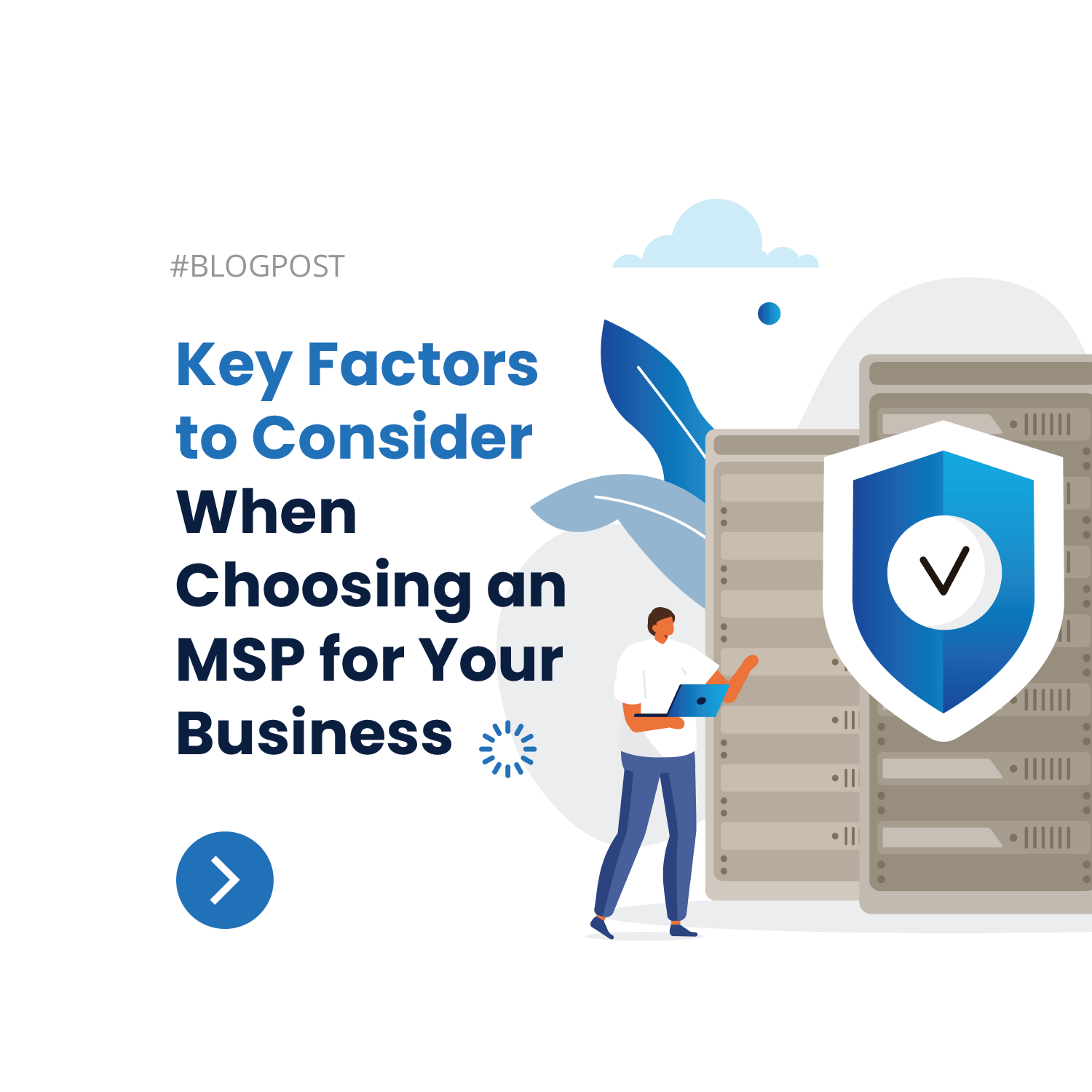Key Factors to Consider When Choosing Your MSP Provider
In the ever-evolving landscape of modern business, technology plays a pivotal role in shaping success. From streamlined operations to efficient customer interactions, businesses today rely heavily on their IT infrastructure to thrive. However, managing complex IT systems can be a daunting task, especially for small to medium-sized enterprises with limited resources. This is where Managed Service Providers (MSPs) step in as invaluable partners.
At its core, the concept of Managed Service Providers revolves around outsourcing various IT functions to expert professionals who specialize in managing and optimizing technology environments. Whether it's network monitoring, cybersecurity, data management, or cloud integration, MSPs offer a comprehensive suite of services designed to alleviate the burdens of IT management. But beyond the technicalities, the true significance of MSPs lies in their ability to empower businesses of all sizes to focus on what they do best, while leaving the intricate realm of technology to those who excel in it.
In this article, we will delve into the key factors that every business should consider when selecting an MSP. From understanding your specific needs to evaluating services, expertise, and support options, we'll guide you through the critical aspects of making an informed decision. By the end of this read, you'll be well-equipped to navigate the maze of MSP options and choose a partner that aligns perfectly with your business goals. So, let's explore how outsourcing IT services through an MSP can not only bridge technological gaps but also catalyze the growth and success of businesses in today's competitive world.
Understanding Needs:
Understanding your specific business requirements and IT needs is a fundamental step in the process of selecting the right Managed Service Provider (MSP). This entails a thorough analysis of your company's operations, objectives, and pain points. By identifying the unique challenges you face and the goals you aim to achieve, you can pinpoint the exact areas where an MSP's expertise can provide the most value. This understanding serves as a crucial roadmap for evaluating potential MSPs and ensures that the chosen partner aligns seamlessly with your business's technological aspirations.
Things to consider:
- Identify Areas for Improvement: Pinpoint the specific technological gaps and challenges your business is facing.
- Evaluate MSP Expertise: Assess the areas in which Managed Service Providers (MSPs) excel, such as network management, cybersecurity, data storage, and cloud integration.
- Match with Business Needs: Determine which of the MSP's expertise areas align with your business's needs and where you lack in-house skills.
- Enhance Efficiency and Security: Utilize the specialized skills of an MSP to enhance operational efficiency, bolster cybersecurity measures, and ensure seamless data management.
- Proactive Partnership: By focusing on the areas where an MSP can provide the most value, you're fostering a proactive and collaborative partnership that contributes to your business's overall success.
Range of Services Offered:
Evaluating the services offered by different Managed Service Providers (MSPs) is a critical step in finding the right partner for your business. Each MSP has its own range of offerings and strengths, and a thorough assessment helps you align their services with your specific needs. By comparing the breadth and depth of services, you can ensure that the selected MSP provides a comprehensive solution that not only addresses current challenges but also anticipates future requirements, making your IT management efficient and effective.
Common services provided by Managed Service Providers (MSPs):
- Network Monitoring and Management: Constant monitoring and optimization of network infrastructure to ensure smooth operations and quick issue resolution.
- Cybersecurity Solutions: Implementing robust security measures like firewalls, antivirus software, intrusion detection, and security audits to safeguard against cyber threats.
- Data Backup and Recovery: Regularly backing up critical data and creating recovery plans to mitigate the impact of data loss or system failures.
- Cloud Services: Assisting with cloud migration, management, and optimization, along with services for data storage, application deployment, and scalability.
- Remote IT Support: Offering remote troubleshooting, technical assistance, and issue resolution to ensure minimal disruptions.
- IT Infrastructure Management: Handling hardware and software infrastructure, including server maintenance, updates, and scalability planning.
- Help Desk Support: Providing end-user support for technical issues and inquiries, enhancing user experience and productivity.
- Vendor Management: Coordinating relationships with various technology vendors to ensure seamless integration and service delivery.
- IT Consultation: Offering expert advice on technology strategies, upgrades, and solutions that align with business goals.
- Disaster Recovery Planning: Developing strategies and protocols to recover and restore IT operations in the event of a disaster or data breach.
- Managed Print Services: Optimizing and managing print infrastructure, reducing costs and enhancing document management.
- Mobile Device Management: Ensuring the security and management of mobile devices used within the organization.
- Software Patch Management: Regularly updating software applications and systems to prevent vulnerabilities and ensure performance.
- Compliance and Regulatory Support: Assisting businesses in adhering to industry-specific regulations and data protection laws.
- Infrastructure Virtualization: Creating virtual versions of hardware resources, leading to better resource utilization and cost savings.
- Unified Communications: Integrating various communication tools like email, instant messaging, and video conferencing for streamlined collaboration.
- Monitoring and Analytics: Utilizing data analytics to monitor system performance, predict issues, and optimize IT operations.
Select an MSP that aligns not only with your current needs but also anticipates your future requirements, mitigating the need for frequent provider changes. This ensures a long-lasting and seamless partnership that grows alongside your business.
Expertise and Experience
The expertise and experience held by Managed Service Providers (MSPs) are of paramount importance in ensuring the success of your IT endeavors. It's prudent to seek MSPs with a track record of effectively managing businesses that share similarities with your own. In your evaluation process, pay close attention to their certifications, solid partnerships with technology vendors, and feedback from satisfied clients. These factors collectively offer a tangible glimpse into their capabilities and reliability, helping you make a confident choice for your business's technology management.
Flexibility and Scalability
Choosing an MSP that exhibits scalability is crucial to accommodate your business's growth trajectory. A partner capable of expanding their services seamlessly as your operations evolve ensures a streamlined transition without disruptions. Equally significant is the element of flexibility – an MSP that can swiftly adapt to shifting business requirements remains invaluable. During your selection process, inquire about their capacity to handle sudden changes or increased demand, as this agility demonstrates their commitment to being a dynamic and reliable extension of your team.
Cybersecurity Measures
In the rapidly evolving digital landscape, cybersecurity stands as a paramount concern for businesses of all sizes. As you evaluate potential Managed Service Providers (MSPs), placing a spotlight on their approach to safeguarding your business from cyber threats is non-negotiable. Engage in detailed conversations to understand the strategies they employ, including advanced features like intrusion detection systems, routine security audits, and comprehensive employee training initiatives. An MSP's robust cybersecurity measures not only shield your operations but also demonstrate their dedication to fortifying your digital resilience against the ever-evolving landscape of cyber risks.
Communication and Support
Clear and effective communication channels between your business and the chosen Managed Service Provider (MSP) are paramount for a successful partnership. As you delve into selecting the right MSP, emphasize the significance of seamless communication that keeps you informed at all stages. Inquire about their support options, response times, and availability – the assurance of round-the-clock assistance can be invaluable for businesses requiring uninterrupted operations. A trustworthy MSP not only ensures timely issue resolution but also proactively anticipates potential concerns, allowing you to focus on your core business activities with peace of mind.
Cost and Value
When considering a partnership with a Managed Service Provider (MSP), striking the right balance between cost and value is imperative. Take time to delve into the various pricing models they offer – whether it's a flat fee, per-user charges, or tiered packages. While costs are a consideration, evaluating the value their services bring to your business is equally vital. Assess how their expertise enhances your operations, streamlines processes, and fortifies your IT infrastructure. Additionally, ponder the potential cost savings of outsourcing IT needs as opposed to maintaining an in-house IT team. This analysis can reveal the economic advantages that a well-aligned MSP can bring, positioning your business for efficient growth and innovation.
Data Privacy and Compliance
In today's interconnected world, the significance of data privacy cannot be overstated, particularly for industries governed by stringent regulations. As you navigate the selection process for a Managed Service Provider (MSP), emphasize the critical nature of data privacy within your industry. Ensure the MSP comprehends and adheres to pertinent data protection laws, underscoring their commitment to maintaining the confidentiality and integrity of your information. Inquire about their measures for data encryption, secure storage, and comprehensive compliance practices. A reputable MSP should have stringent protocols in place to safeguard your sensitive data while aligning seamlessly with the regulatory landscape of your sector.
Contract Terms and SLAs
As you embark on the journey of selecting a Managed Service Provider (MSP), it's essential to guide your focus towards the fine print of contract terms and Service Level Agreements (SLAs). Encourage thorough review to ensure clarity on what services are covered, the expected response times, and protocols for issue resolution. Clear expectations foster a smooth partnership, minimizing potential misunderstandings down the line. Equally crucial is discussing an exit strategy, a consideration often overlooked. Inquire about procedures and contingencies should the need to transition to a new provider arise. Planning ahead for such scenarios ensures that even in the event of change, your business's technological operations remain stable and secure.
Conclusion
In the dynamic landscape of modern business, choosing the right Managed Service Provider (MSP) can be the pivotal step that propels your organization toward technological excellence and success. By understanding your specific business needs, aligning with an MSP's expertise, and assessing their track record, you lay the foundation for a partnership that transforms your IT operations. The significance of clear communication, robust cybersecurity, and a balance between cost and value cannot be underestimated, all contributing to a harmonious collaboration that accelerates your business growth. As you embark on this journey, remember to keep data privacy and compliance at the forefront, ensuring your operations adhere to industry regulations.
Furthermore, delve into the minutiae of contract terms and SLAs to establish transparent expectations, setting the stage for a reliable and productive partnership. A well-chosen MSP not only offers technical solutions but also provides strategic insights, helping you navigate the complexities of the digital landscape.
In a world where technology drives innovation, productivity, and resilience, an astutely chosen MSP becomes an extension of your team, facilitating your business's evolution and progress. By focusing on the key factors highlighted in this article, you're poised to select an MSP that isn't just a service provider, but a strategic ally, enabling your organization to thrive in the ever-evolving world of business and technology.




